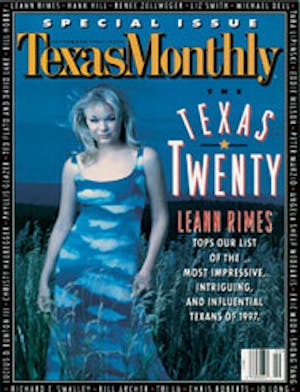“DISGUISED IN SHIRTSLEEVES and an apron—the better to blend in with the waiters and cooks—Tri La, the 33-year-old manager of Houston’s Kim Son Vietnamese restaurants, sipped iced tea and politely answered questions on his least favorite subject: himself. Whenever the conversation shifted to business, he relaxed, like a man whose appointment for a root canal had just been canceled. When the topic returned to him, the most self-effacing entrepreneur in Houston became distinctly uneasy.
“I don’t want a big title,” he replied when asked why he wasn’t designated “president” or “vice president.” “My business card says ‘manager’ because if I use a big title, I don’t feel good. If you do well, people know. If you have to tell them, it is not so good. I want to be small, not big.”
It’s a little late for that. With 600 to 700 customers a day at the minichain’s flagship location near downtown, an additional 550 to 750 at its three other locations, and hundreds more at its five Little Kim Son self-serve outlets, Kim Son is the largest Asian restaurant group in Houston and one of the biggest in Texas. And though he would prefer not to be, Tri Lathe second son of restaurant founders and owners Kim and Son La and a driving force behind the business’s remarkable growthis big too.
In its fifteen years of existence, Kim Son has grown from a mom-and-pop cafe to a corporation with more than two hundred employees and sales in excess of $7 million a year. In one way it could be any American restaurant success story, but Kim Son’s is intriguing because it parallels the larger Vietnamese experience in Americaa chronicle of immigrants’ striving to fit into a new environment while struggling to preserve their original identity. Tri La, who is sort of a cultural translator between the family and the outside world, has felt acutely the tug of those two realms.
In 1979 Kim and Son La and their seven children fled the communist regime of Vietnam. Luckier than many boat people, they made it to a refugee camp in Malaysia and, in 1980, received approval to join relatives in Houston. In 1982, in the tradition of immigrants the world over, they opened a restaurant. The kids waited tables, Son was the manager, and Kim cooked the savory dishes, such as black-pepper crabs, that had been a mainstay of the restaurant they had owned in Vietnam. At first, all of their customers were Vietnamese, but when the business moved to larger quarters the next year, a few curious Anglos began to turn up. The encounters were not always encouraging.
“At the beginning, the Americans would take one sniff of our Vietnamese fish sauce and ask for sweet-and-sour sauce,” Tri La remembers. “I felt not too good about that.” But instead of fuming or retreating into the Vietnamese community, La and his family began to teach their non-Asian customers about spring rolls and crisp tempura-battered Treasure Fish, and in exchange they learned what Americans liked and disliked about Vietnamese food and expected in the way of service and atmosphere. As the restaurant grew, it became a personal melting pot where all of the family members, especially Tri La, struggled with the disparate demands of their roots in the old world (which say, “Put the family above self, eschew the spotlight, stay small”) and their future in the new (which says, “Cultivate personal ambition, stand out, be big”).
Even as they worked to balance the two viewpoints, the more immediate cross- cultural exchange was working beautifully. In 1993 the La family, which had opened yet another restaurant in 1987, launched its biggest venture yet, a brand-new $2 million, 22,000-square-foot behemoth with a pagoda roof near the downtown business district. It embodied key elements of both its heritages: The recipes were Vietnamese (with some Chinese), altered only slightly for American tastes, and the operating systems (touch-screen computers, seating flow chart, stainless steel kitchen) were American.
Today Tri La continues to walk his own tightrope between Vietnam and America, past and future, large and small. “Our restaurant is recognized nationwidewe get calls every few weeks about franchising,” he says, sounding pleased but not boastful. Eventually, he wants to open two more Kim Sons in Houston, then expand to Dallas, San Antonio, Austin, Los Angeles, and other cities. The goal is ambitious, even contradictory, for a self-effacing man. Clearly, though, by letting the business serve as the canvas for his aspirations, La has found a way to reconcile the dualities in his life. In a few years Kim Son likely will have grown to be very big, and Tri La will remainat least in his own estimationsmall.
- More About:
- Houston








